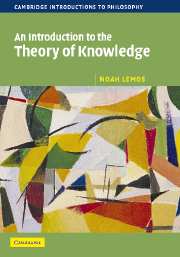Book contents
- Frontmatter
- Contents
- Preface
- 1 Knowledge, truth, and justification
- 2 The traditional analysis and the Gettier problem
- 3 Foundationalism
- 4 The coherence theory of justification
- 5 Reliabilism and virtue epistemology
- 6 Internalism, externalism, and epistemic circularity
- 7 Skepticism
- 8 The problem of the criterion
- 9 The a priori
- 10 Naturalized epistemology
- Select bibliography
- Index
- References
Select bibliography
- Frontmatter
- Contents
- Preface
- 1 Knowledge, truth, and justification
- 2 The traditional analysis and the Gettier problem
- 3 Foundationalism
- 4 The coherence theory of justification
- 5 Reliabilism and virtue epistemology
- 6 Internalism, externalism, and epistemic circularity
- 7 Skepticism
- 8 The problem of the criterion
- 9 The a priori
- 10 Naturalized epistemology
- Select bibliography
- Index
- References
Information
- Type
- Chapter
- Information
- An Introduction to the Theory of Knowledge , pp. 219 - 226Publisher: Cambridge University PressPrint publication year: 2007
